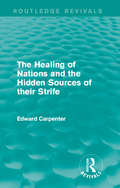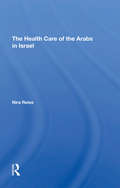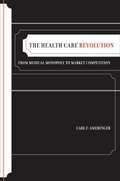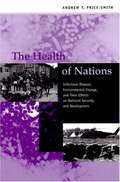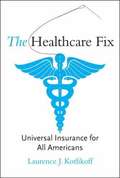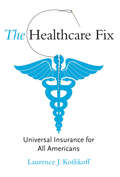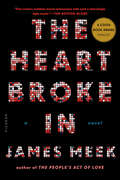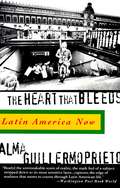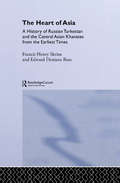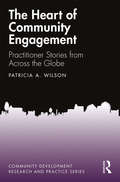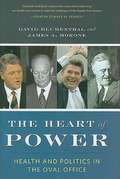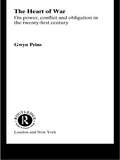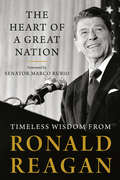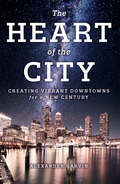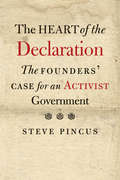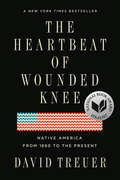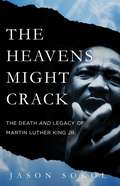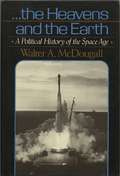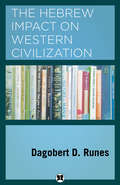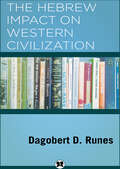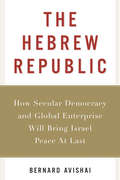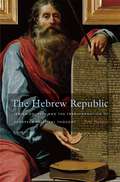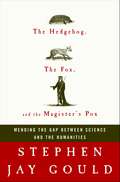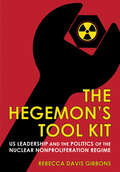- Table View
- List View
The Healing of Nations and the Hidden Sources of their Strife (Routledge Revivals: The Collected Works of Edward Carpenter)
by Edward CarpenterOriginally published in 1915 in the middle of World War I, Carpenter explores the effects that the war was having on society and humankind as a whole from first-hand experience. In particular, papers focus on the differences between Germany and England, the causes of the war and suggestions for restoration and recovery when the war has ended. Carpenter details all of this in a realistic way drawing on matters such as class to put forward his anti-war stance as well as philosophical approaches to coping with tragedy. This title will be of interest to students of history, sociology and politics.
The Health Care Of The Arabs In Israel
by Nira ReissA study of the development of modern medical health services in Palestine until 1948 and in Israel, this book focuses on the interaction of state policy, class relations, voluntary organizations, and professional practice as they affect the level of participation of Arabs in the emergent health system.
The Health Care Revolution: From Medical Monopoly to Market Competition
by Carl F. AmeringerThis book explains how the revolution of America's market-based health care system came into being when the U.S. Supreme Court and Congress prompted the antitrust agencies of the federal government to change the rules of the health care system. Ameringer lays out the key events that led up to this regime change; explores its broader social, political, and economic contexts; examines the views of both its proponents and opponents; and considers its current trajectory.
The Health of Nations: Infectious Disease, Environmental Change, and Their Effects on National Security and Development
by Andrew T. Price-SmithSmith investigates the influence of infectious disease on nations' stability and prosperity. He also provides a theoretical and empirical foundation for the emerging field of health security.
The Healthcare Fix: Universal Insurance for All Americans
by Laurence J. KotlikoffKotlikoff proposes a simple, straightforward approach to the problem that would create one system that works for everyone and secure America's fiscal and economic future. His proposed Medical Security System is not the socialized medicine so feared by Republicans and libertarians.
The Healthcare Fix: Universal Insurance for All Americans (The\mit Press Ser.)
by Laurence J. KotlikoffA simple, straightforward, and foolproof proposal for universal health insurance from a noted economist.The shocking statistic is that forty-seven million Americans have no health insurance. When uninsured Americans go to the emergency room for treatment, however, they do receive care, and a bill. Many hospitals now require uninsured patients to put their treatment on a credit card which can saddle a low-income household with unpayably high balances that can lead to personal bankruptcy. Why don't these people just buy health insurance? Because the cost of coverage that doesn't come through an employer is more than many low- and middle-income households make in a year. Meanwhile, rising healthcare costs for employees are driving many businesses under. As for government-supplied health care, ever higher costs and added benefits (for example, Part D, Medicare's new prescription drug coverage) make both Medicare and Medicaid impossible to sustain fiscally; benefits grow faster than the national per-capita income. It's obvious the system is broken. What can we do?In The Healthcare Fix, economist Laurence Kotlikoff proposes a simple, straightforward approach to the problem that would create one system that works for everyone and secure America's fiscal and economic future. Kotlikoff's proposed Medical Security System is not the "socialized medicine" so feared by Republicans and libertarians; it's a plan for universal health insurance. Because everyone would be insured, it's also a plan for universal healthcare. Participants—including all who are currently uninsured, all Medicaid and Medicare recipients, and all with private or employer-supplied insurance—would receive annual vouchers for health insurance, the amount of which would be based on their current medical condition. Insurance companies would willingly accept people with health problems because their vouchers would be higher. And the government could control costs by establishing the values of the vouchers so that benefit growth no longer outstrips growth of the nation's per capita income. It's a "single-payer" plan, but a single payer for insurance. The American healthcare industry would remain competitive, innovative, strong, and private.Kotlikoff's plan is strong medicine for America's healthcare crisis, but brilliant in its simplicity. Its provisions can fit on a postcard and Kotlikoff provides one, ready to be copied and mailed to your representative in Congress.
The Heart Broke In: A Novel
by James MeekFrom James Meek, the award-winning author of the international bestseller The People's Act of Love, comes a rich and intricate novel about everything that matters to us now: children, celebrity, secrets and shame, the quest for youth, loyalty and betrayal, falls from grace, acts of terror, and the wonderful, terrible inescapability of family.Ritchie Shepherd, an aging pop star and a producer of a reality show for teen talent, is starting to trip over his own lies. Maybe filming a documentary about his father, Captain Shepherd, a British soldier executed by Northern Irish guerrillas, will redeem him.His sister, Bec, is getting closer and closer to a vaccine for malaria. When she's not in Tanzania harvesting field samples, she's peering through a microscope at her own blood to chart the risky treatment she's testing on herself. She's as addicted to honesty as Ritchie is to trickery.Val Oatman is the editor of a powerful tabloid newspaper. The self-appointed conscience of the nation, scourge of hypocrites and cheats, he believes he will marry beautiful Bec.Alex Comrie, a gene therapist (and formerly the drummer in Ritchie's band), is battling his mortally ill uncle, a brilliant and domineering scientist, over whether Alex might actually have discovered a cure for aging. Alex, too, believes he will marry Bec.Colum O'Donabháin has just been released from prison, having served a twenty-five-year sentence for putting a gun to Captain Shepherd's head when he refused to give up an informer. He now writes poetry.Their stories meet and tangle in this bighearted epic that is also shrewd, starkly funny, and utterly of the moment. The Heart Broke In is fiction with the reverberating resonance of truth.
The Heart That Bleeds: Latin America Now
by Alma GuillermoprietoAn extraordinarily vivid, unflinching series of portraits of South America today, written from the inside out, by the award-winning New Yorker journalist and widely admired author of Samba.From the Trade Paperback edition.
The Heart of Asia: A History of Russian Turkestan and the Central Asian Khanates from the Earliest Times
by Edward Denison Ross Frances Henry SkrineOriginally published in 1899, The Heart of Asia is a definitive history of Central Asia from pre-history to the contemporary machinations of the Russian empire. The book is valuable not only because of the quality of the historical work on the early period, but also because of the unique picture that it gives of contemporary views on the potential for Anglo-Russian conflict, at a time when the Russian Empire was Britain's closest rival for Asian hegemony.Scholars of modern Russia and Central Asia will find much that echoes, and indeed drives, more recent events. Includes 34 illustrations and two maps.
The Heart of Community Engagement: Practitioner Stories from Across the Globe (Community Development Research and Practice Series)
by Patricia A. WilsonDrawing on first-hand accounts of action research in the Americas, Africa, and Asia, The Heart of Community Engagement illustrates the transformative learning journeys of exemplary catalysts for community-based change. Practitioners’ stories of community engagement for social justice in the Global South elucidate the moments of insight and transformation that deepened their practice: how to deal with uncertainty, recognize their own blind spots, become aware of what is emergent and possible in the moment, and weave an inclusive bond of love, respect, and purpose. Each successive narrative adds a deeper level of understanding of the inner practice of community engagement. The stories illuminate the reflective, or inner, practice of the outside change agent, whether a planner, designer, participatory action researcher, or community development practitioner. From a shantytown in South Africa, to a rural community in India, or an informal settlement in peri-urban Mexico, the stories focus attention on the greatest leverage point for change that we, as engaged practitioners, have: our own self-awareness. By the end of the book, the practitioners are not only aware of their own conditioned beliefs and assumptions, but have opened their minds and hearts to the complex and dynamic patterns of emergent change that is possible. This book serves as a much-needed reader of practice stories to help instructors and students find the words, concepts, and examples to talk about their own subjective experience of community engagement practice. The book applies some of the leading-edge concepts from organizational development and leadership studies to the fields of planning, design, and community engagement practice. Key concepts include the deep dive of sensing the social field, seeing the whole, and presencing the emergent future. The book also provides a creative bridge between participatory action research and design thinking: user-based design, rapid prototyping, and learning from doing.
The Heart of Power: Health and Politics in the Oval Office
by James A. Morone David BlumenthalDavid and James break new ground in our understanding of health policymaking in the White House, notably the tie between presidential policy actions and the personal medical problems that have faced each of our Presidents since Franklin D. Roosevelt.
The Heart of War: On Power, Conflict and Obligation in the Twenty-first Century
by Gwyn PrinsMilitary forces are now confronted, not only with the non-conventional threats of terrorism but the moral dilemmas of humanitarianism, intervention and human rights. Gwyn Prins explores these conflicting impulses using a variety of fascinating examples: the September 11th attacks and the history of 'spectacular' terrorism, humanitarian intervention in Bosnia, Kosovo, West Africa and elsewhere, the extradition of General Pinochet for human rights abuses and the nuclear issue, in the light of ongoing conflict between India and Pakistan.Wide-ranging and challenging, this book will interest all those seeking to understand the enormous recent changes in military strategy and global politics.
The Heart of a Great Nation: Timeless Wisdom from Ronald Reagan
by Ronald ReaganWith a foreword from Senator Marco Rubio, a stirring collection of Ronald Reagan's most inspiring speeches, offering his timeless wisdom and guidance for our day.In his 1989 farewell address, Ronald Reagan said, "I wasn't a great communicator, but I communicated great things, and they didn't spring full bloom from my brow, they came from the heart of a great nation--from our experience, our wisdom, and our belief in principles that have guided us for two centuries."The Heart of a Great Nation brings together Reagan's most powerful speeches, as relevant to our chaotic world as they were when he first gave them. In a period of our country's history consumed by economic stagnation, national instability, and the looming threat of communism, Reagan spoke directly to the hearts of everyday Americans. His wisdom on matters of family, freedom, and nationhood helped guide the country back to its founding principles and ushered in an era of prosperity and national pride. Today, as we find our country treading similar ground, Reagan's wisdom speaks to us once again, offering guidance to everyone looking to navigate the present and remember the legacy of this great nation--which can one day be reclaimed.
The Heart of the City: Creating Vibrant Downtowns for a New Century
by Alexander GarvinDowntowns are more than economic engines: they are repositories of knowledge and culture and generators of new ideas, technology, and ventures. They are the heart of the city that drives its future. If we are to have healthy downtowns, we need to understand what downtown is all about; how and why some American downtowns never stopped thriving (such as San Jose and Houston), some have been in decline for half a century (including Detroit and St. Louis), and still others are resurging after temporary decline (many, including Lower Manhattan and Los Angeles). The downtowns that are prospering are those that more easily adapt to changing needs and lifestyles.In The Heart of the City, distinguished urban planner Alexander Garvin shares lessons on how to plan for a mix of housing, businesses, and attractions; enhance the public realm; improve mobility; and successfully manage downtown services. Garvin opens the book with diagnoses of downtowns across the United States, including the people, businesses, institutions, and public agencies implementing changes. In a review of prescriptions and treatments for any downtown, Garvin shares brief accounts—of both successes and failures—of what individuals with very different objectives have done to change their downtowns. The final chapters look at what is possible for downtowns in the future, closing with suggested national, state, and local legislation to create standard downtown business improvement districts to better manage downtowns.This book will help public officials, civic organizations, downtown business property owners, and people who care about cities learn from successful recent actions in downtowns across the country, and expand opportunities facing their downtown. Garvin provides recommendations for continuing actions to help any downtown thrive, ensuring a prosperous and thrilling future for the 21st-century American city.
The Heart of the Declaration: The Founders' Case for an Activist Government
by Steve PincusAn eye-opening, meticulously researched new perspective on the influences that shaped the Founders as well as the nation's founding document From one election cycle to the next, a defining question continues to divide the country's political parties: Should the government play a major or a minor role in the lives of American citizens? The Declaration of Independence has long been invoked as a philosophical treatise in favor of limited government. Yet the bulk of the document is a discussion of policy, in which the Founders outlined the failures of the British imperial government. Above all, they declared, the British state since 1760 had done too little to promote the prosperity of its American subjects. Looking beyond the Declaration's frequently cited opening paragraphs, Steve Pincus reveals how the document is actually a blueprint for a government with extensive powers to promote and protect the people's welfare. By examining the Declaration in the context of British imperial debates, Pincus offers a nuanced portrait of the Founders' intentions with profound political implications for today.
The Heartbeat of Wounded Knee: Native America from 1890 to the Present
by David TreuerA sweeping history--and counter-narrative--of Native American life from the Wounded Knee massacre to the present. <P><P>The received idea of Native American history--as promulgated by books like Dee Brown's mega-bestselling 1970 Bury My Heart at Wounded Knee--has been that American Indian history essentially ended with the 1890 massacre at Wounded Knee. <P><P>Not only did one hundred fifty Sioux die at the hands of the U. S. Cavalry, the sense was, but Native civilization did as well. Growing up Ojibwe on a reservation in Minnesota, training as an anthropologist, and researching Native life past and present for his nonfiction and novels, David Treuer has uncovered a different narrative. <P><P>Because they did not disappear--and not despite but rather because of their intense struggles to preserve their language, their traditions, their families, and their very existence--the story of American Indians since the end of the nineteenth century to the present is one of unprecedented resourcefulness and reinvention. <P><P>In The Heartbeat of Wounded Knee, Treuer melds history with reportage and memoir. Tracing the tribes' distinctive cultures from first contact, he explores how the depredations of each era spawned new modes of survival. <P><P>The devastating seizures of land gave rise to increasingly sophisticated legal and political maneuvering that put the lie to the myth that Indians don't know or care about property. The forced assimilation of their children at government-run boarding schools incubated a unifying Native identity. <P><P>Conscription in the US military and the pull of urban life brought Indians into the mainstream and modern times, even as it steered the emerging shape of self-rule and spawned a new generation of resistance. The Heartbeat of Wounded Knee is the essential, intimate story of a resilient people in a transformative era. <P><b>A New York Times Bestseller</b>
The Heavens Might Crack: The Death and Legacy of Martin Luther King Jr.
by Jason SokolA vivid portrait of how Americans grappled with King's death and legacy in the days, weeks, and months after his assassinationOn April 4, 1968, Martin Luther King Jr. was fatally shot as he stood on the balcony of the Lorraine Motel in Memphis. At the time of his murder, King was a polarizing figure--scorned by many white Americans, worshipped by some African Americans and liberal whites, and deemed irrelevant by many black youth. In The Heavens Might Crack, historian Jason Sokol traces the diverse responses, both in America and throughout the world, to King's death. Whether celebrating or mourning, most agreed that the final flicker of hope for a multiracial America had been extinguished.A deeply moving account of a country coming to terms with an act of shocking violence, The Heavens Might Crack is essential reading for anyone seeking to understand America's fraught racial past and present.
The Heavens and the Earth: A Political History of the Space Age
by Walter A. McdougallThis highly acclaimed study approaches the space race as a problem in comparative public policy. Drawing on published literature, archival sources in both the United States and Europe, interviews with many of the key participants, and important declassified material, such as the National Security Council's first policy paper on space, McDougall examines U.S., European, and Soviet space programs and their politics. Opening with a short account of Nikolai Kibalchich, a late nineteenth-century Russian rocketry theoretician, McDougall argues that the Soviet Union made its way into space first because it was the world's first "technocracy"―which he defines as "the institutionalization of technological change for state purpose." He also explores the growth of a political economy of technology in both the Soviet Union and the United States.<P><P> Pulitzer Prize Winner
The Hebrew Impact on Western Civilization
by Dagobert D. RunesAn eye-opening classic volume on the enduring cultural impact of the Jewish people This authoritative work considers the creative and cultural influence of the Jews throughout our time. At more than 800 pages, D. D. Runes has complied a mid-twentieth century account of the various contributions in many spheres in which the Jews have had an impact on western civilization. Eminent scholars consider the ways in which the Jews contributed toward the making of modern society and helped in raising human standards and values. Richard Van Dyck, in "The Jewish Influence on Journalism," observes that the preponderance of Jewish newspapermen disproves the commonly held belief that Jewish journalism is "necessarily subversive." William B. Ziff's "The Jew as Soldier, Strategist and Military Adviser" delineates the successes of Jewish military forces throughout history. Dr. Abraham I. Katsh discusses "The Hebraic Foundations of American Democracy," noting the influence of Hebrew Scriptures on standards of conduct in western civilization. Curtis Lubinski's "The Jew in Drama, Theatre, and Film" traces the success of Jewish performers and dramatists. The essays compiled in this volume are a fascinating and expansive look at the far-reaching impact Jews have had on Western life.
The Hebrew Impact on Western Civilization
by Dagobert D. RunesThis wide-ranging anthology examines the enduring cultural impact of the Jewish people and their many contributions to the creation of modern society.Edited by philosopher and intellectual historian Dagobert D. Runes, The Hebrew Impact on Western Civilization is a scholarly and authoritative account of the many spheres in which the Jews have impacted Western civilization. A diverse collection of eminent scholars consider how the Jews altered the course of the contemporary world and helped raise the standard of human values. William B. Ziff&’s &“The Jew as Soldier, Strategist and Military Adviser&” delineates the successes of Jewish military forces throughout history. Dr. Abraham I. Katsh discusses the &“Hebraic Foundations of American Democracy,&” noting the influence of Hebrew Scriptures on standards of conduct in western civilization. These and other essays offer a fascinating and expansive look at the far-reaching impact Jews have had on Western life.
The Hebrew Republic
by Bernard AvishaiPolitical economist Bernard Avishai has been writing and thinking about Israel since moving there to volunteer during the 1967 War. now he synthesizes his years of study and searching into a short, urgent polemic that posits that the country must become a more complete democracy if it has any chance for a peaceful future. He explores the connection between Israel's democratic crisis and the problems besetting the nation--the expansion of settlements, the alienation of Israeli Arabs, and the exploding ultraorthodox population. He also makes an intriguing case for Israel's new global enterprises to change the country's future for the better. With every year, peace in Israel seems to recede further into the distance, while Israeli arts and businesses advance. This contradiction cannot endure much longer. But in cutting through the inflammatory arguments of partisans on all sides, Avishai offers something even more enticing than pragmatic solutions--he offers hope.
The Hebrew Republic: Jewish Sources and the Transformation of European Political Thought
by Eric NelsonAccording to a commonplace narrative, the rise of modern political thought in the West resulted from secularization the exclusion of religious arguments from political discourse. But in this pathbreaking work, Eric Nelson argues that this familiar story is wrong. Instead, he contends, political thought in early-modern Europe became less, not more, secular with time, and it was the Christian encounter with Hebrew sources that provoked this radical transformation. During the sixteenth and seventeenth centuries, Christian scholars began to regard the Hebrew Bible as a political constitution designed by God for the children of Israel. Newly available rabbinic materials became authoritative guides to the institutions and practices of the perfect republic. This thinking resulted in a sweeping reorientation of political commitments. In the book s central chapters, Nelson identifies three transformative claims introduced into European political theory by the Hebrew revival: the argument that republics are the only legitimate regimes; the idea that the state should coercively maintain an egalitarian distribution of property; and the belief that a godly republic would tolerate religious diversity. One major consequence of Nelson s work is that the revolutionary politics of John Milton, James Harrington, and Thomas Hobbes appear in a brand-new light. Nelson demonstrates that central features of modern political thought emerged from an attempt to emulate a constitution designed by God. This paradox, a reminder that while we may live in a secular age, we owe our politics to an age of religious fervor, in turn illuminates fault lines in contemporary political discourse.
The Hedgehog, the Fox, and the Magister's Pox: Mending the Gap Between Science and the Humanities
by Stephen Jay GouldIn his final book and his first full-length original title since Full House in 1996, the eminent paleontologist Stephen Jay Gould offers a surprising and nuanced study of the complex relationship between our two great ways of knowing: science and the humanities, twin realms of knowledge that have been divided against each other for far too long. To establish his two protagonists, Gould draws from a seventh century b.c. proverb attributed to the Greek soldier-poet Archilochus that said roughly, "The fox devises many strategies; the hedgehog knows one great and effective strategy." While emphatically rejecting any simplistic attempt to assign either science or the humanities to one or the other of these approaches to knowledge, Gould uses this ancient concept to demonstrate that neither strategy can work alone, but that these seeming opposites can be conjoined into a common enterprise of tremendous unity and power. In building his case, Gould shows why the common assumption of an inescapable conflict between science and the humanities (in which he includes religion) is false, mounts a spirited rebuttal to the ideas that his intellectual rival E. O. Wilson set forth in his book Consilience, and explains why the pursuit of knowledge must always operate upon the bedrock of nature's randomness.The Hedgehog, the Fox, and the Magister's Pox is a controversial discourse, rich with facts and observations gathered by one of the most erudite minds of our time.
The Hegemon's Tool Kit: US Leadership and the Politics of the Nuclear Nonproliferation Regime (Cornell Studies in Security Affairs)
by Rebecca Davis GibbonsAt a moment when the nuclear nonproliferation regime is under duress, Rebecca Davis Gibbons provides a trenchant analysis of the international system that has, for more than fifty years, controlled the spread of these catastrophic weapons. The Hegemon's Tool Kit details how that regime works and how, disastrously, it might falter. In the early nuclear age, experts anticipated that all technologically-capable states would build these powerful devices. That did not happen. Widespread development of nuclear arms did not occur, in large part, because a global nuclear nonproliferation regime was created. By the late-1960s, the United States and the Soviet Union had drafted the Treaty on the Non-Proliferation of Nuclear Weapons (NPT), and across decades the regime has expanded, with more agreements and more nations participating. As a result, in 2022, only nine states possess nuclear weapons. Why do most states in the international system adhere to the nuclear nonproliferation regime? The answer lies, Gibbons asserts, in decades of painstaking efforts undertaken by the US government. As the most powerful state during the nuclear age, the United States had many tools with which to persuade other states to join or otherwise support nonproliferation agreements. The waning of US global influence, Gibbons shows in The Hegemon's Tool Kit, is a key threat to the nonproliferation regime. So, too, is the deepening global divide over progress on nuclear disarmament. To date, the Chinese government is not taking significant steps to support the nuclear nonproliferation regime, and as a result, the regime may face a harmful leadership gap.
The Hegemony of Growth
by Matthias SchmelzerIn modern society, economic growth is considered to be the primary goal pursued through policymaking. But when and how did this perception become widely adopted among social scientists, politicians and the general public? Focusing on the OECD, one of the least understood international organisations, Schmelzer offers the first transnational study to chart the history of growth discourses. He reveals how the pursuit of GDP growth emerged as a societal goal and the ways in which the methods employed to measure, model and prescribe growth resulted in statistical standards, international policy frameworks and widely accepted norms. Setting his analysis within the context of capitalist development, post-war reconstruction, the Cold War, decolonization, and industrial crisis, The Hegemony of Growth sheds new light on the continuous reshaping of the growth paradigm up to the neoliberal age and adds historical depth to current debates on climate change, inequality and the limits to growth.
